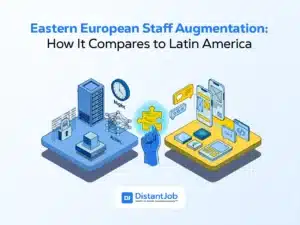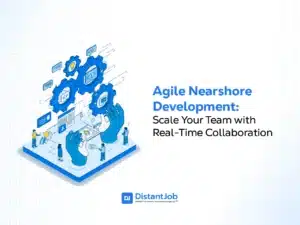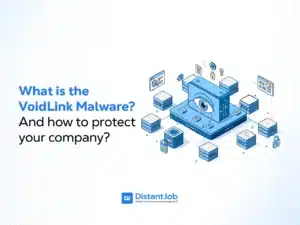The Employer of Record (EOR) and Professional Employer Organization (PEO) provide similar solutions for hiring employees and outsourcing many of the functions that come with it. Yet, they differ in one very important way: the EOR becomes the legal employer for the remote employee.
The following article clarifies the most important differences between EOR and PEO. This is not just academic; the implementation of both solutions comes with different management challenges and legal implications. It is important to understand the main purpose of both solutions and how they can benefit your business, so that you can choose the best option for you. Let’s start.
What is EOR?
An EOR is a third-party service that legally employs your remote/international staff on your behalf. It takes care of running the payroll, withholding taxes, providing benefits and guaranteeing compliance with labor laws in the state or country where the employee resides. All the while, you get to continue managing your employee’s day-to-day work.
Companies use EOR services to hire people in a new state or country where they don’t have incorporation. This kind of service allows businesses to hire individuals in a new location, in a matter of days, and removes the risk, responsibility and capital investment of handling compliance internally.
If you want to hire internationally, you need to have a legal jurisdiction in the countries you’re looking to hire. If you don’t, then opting for EOR services will allow you to manage remote employees, ensuring your business is in compliance with local labor laws, regulations and requirements.
The main responsibilities of EOR include:
- Payroll
- Taxes
- Benefits administration
- Risk mitigation
- Onboarding and offboarding
What is PEO?
A Professional Employer Organization (PEO)is a company that shares employer status with you—handling payroll, benefits, HR paperwork, and compliance—so you run the team while they run the admin.
Their main responsibilities include:
- Payroll processing
- Benefit administration
- Tax filings
EOR vs PEO: 5 Key Differences
At a simple glance, EOR and PEO seem to offer similar services but they are pretty different. EORs act as the sole legal employer, let you hire in new jurisdictions without setting up entities, assume full compliance risk, bill per employee, and onboard in days, while PEOs co-employ staff under your existing entity, split liability, charge a payroll-based fee, and require more setup time.
Let’s go over in depth the four key differences that set these hiring models apart:
1. Employment Structure
An EOR is the legal employer of your company’s international employees. This means they take on all the employment-related responsibilities, including compliance with labor laws, benefits, taxes, etc.
On the other hand, a PEO is a co-employer. While you have control over day-to-day operations, the PEO shares employer responsibilities, such as payroll administration, benefits, and HR compliance.
2. Legal Structure
As EOR directly employs workers on behalf of your company, they assume all legal obligations associated with employment.
In a PEO arrangement, both your company and the PEO share these responsibilities.
3. Control and Flexibility
When working with EOR, you usually have less control over HR functions, as they manage most aspects of employment.
With a PEO, as it’s a co-employment relationship, you share responsibilities; however, PEO focuses more on HR management while you control day-to-day operations.
4. Risk
One major benefit of working with an EOR is that as they are the legal employer of your remote workforce, they assume all the risks and liabilities associated with the services they provide.
This doesn’t happen with PEO, as they’re co-employes, which means your company can have exposure to employment liabilities.
5. Scope
An EOR partner has in-depth knowledge of local hiring practices and laws in various locations, which makes it ideal for businesses that want to hire global talent. As they act as the legal employer, they assume the responsibility of following relevant labor laws and regulations in each location where your workforce is employed.
On the other hand, a PEO partner provides HR services in locations where your company has a legal identity. Since the PEO doesn’t directly employ your workforce, your company is responsible for ensuring labor laws specific to each location.
How to Decide Between EOR or PEO?
In essence, both EOR and PEO focus on providing your company with HR services, including tax compliance, payroll, benefit administration, etc. However, the choice between one or the other comes down to the following factors:
Level of Expansion
If you’re looking to expand your company internationally, then PEO won’t work for you unless you have a legal identity in the place you’re looking to hire employees from.
EOR is the best solution for companies looking to hire international talent legally, as they are legal employers.
Level of Control
For companies that want to get rid of administrative burdens and delegate such tasks to a third party, EORs are the solution.
If you still want to have more control over HR processes and overall employee management, then a PEO can work better for you as they act as co-employers.
HR Needs
If your primary concern is to make sure your business is compliant with local labor laws as well as HR regulations in multiple locations, you’ll benefit more by working with an EOR.
On the other hand, PEOs typically offer a broader range of HR services, including employee training and compliance assistance. This is useful if your company needs comprehensive HR support.
Expand Your Team With The Right Strategy
EOR and PEO are reliable approaches to managing employees and HR tasks seamlessly. Generally, EOR is ideal for businesses looking to expand globally while mitigating risks associated with payroll and legal responsibilities. On the other hand, PEOs offer comprehensive HR solutions partnering with your company.
If you’re looking to expand your team with talented remote developers, we can help. We’re an all-in-one recruitment and EOR solution, offering businesses the opportunity to scale their teams with global developers in just one click.
With our 3-Tier Approval Process, we meticulously vet candidates, beginning with a detailed assessment of client needs, followed by strategic sourcing and thorough review. Our EOR services enable us to hire international developers for you, allowing you to focus solely on your core business operations.
Want to know more? Let’s talk.




